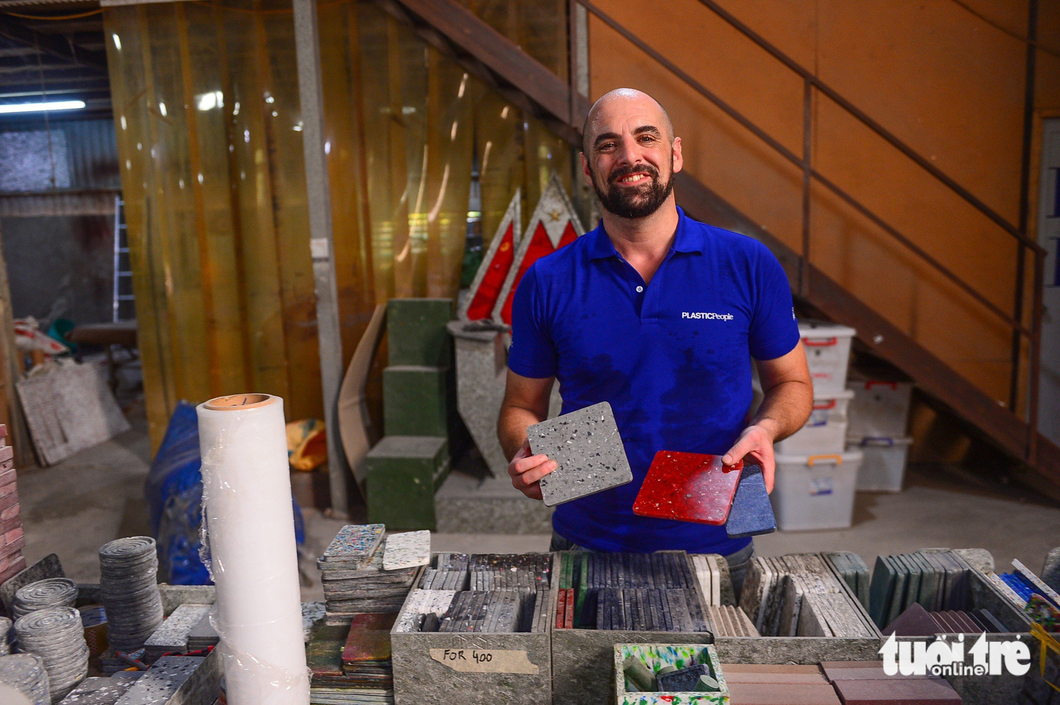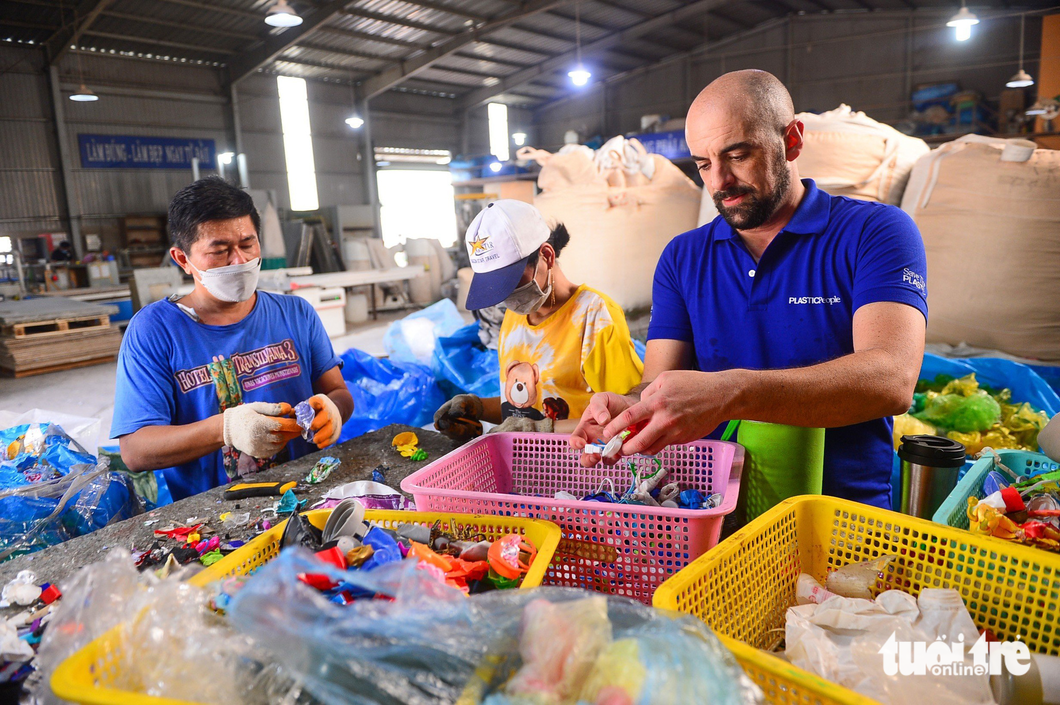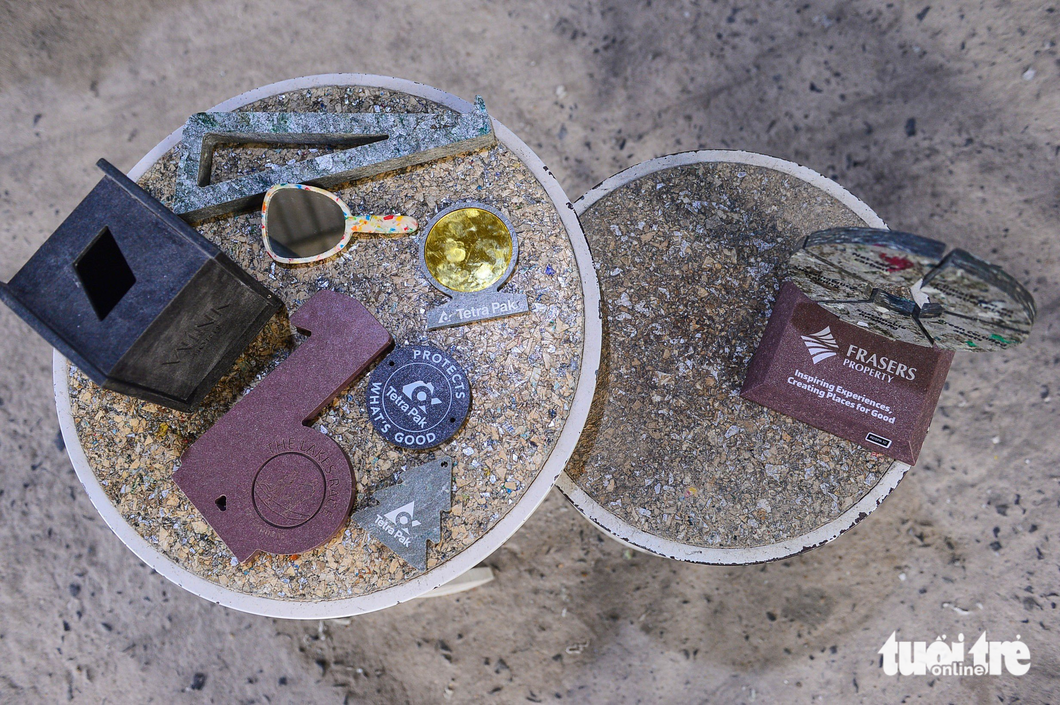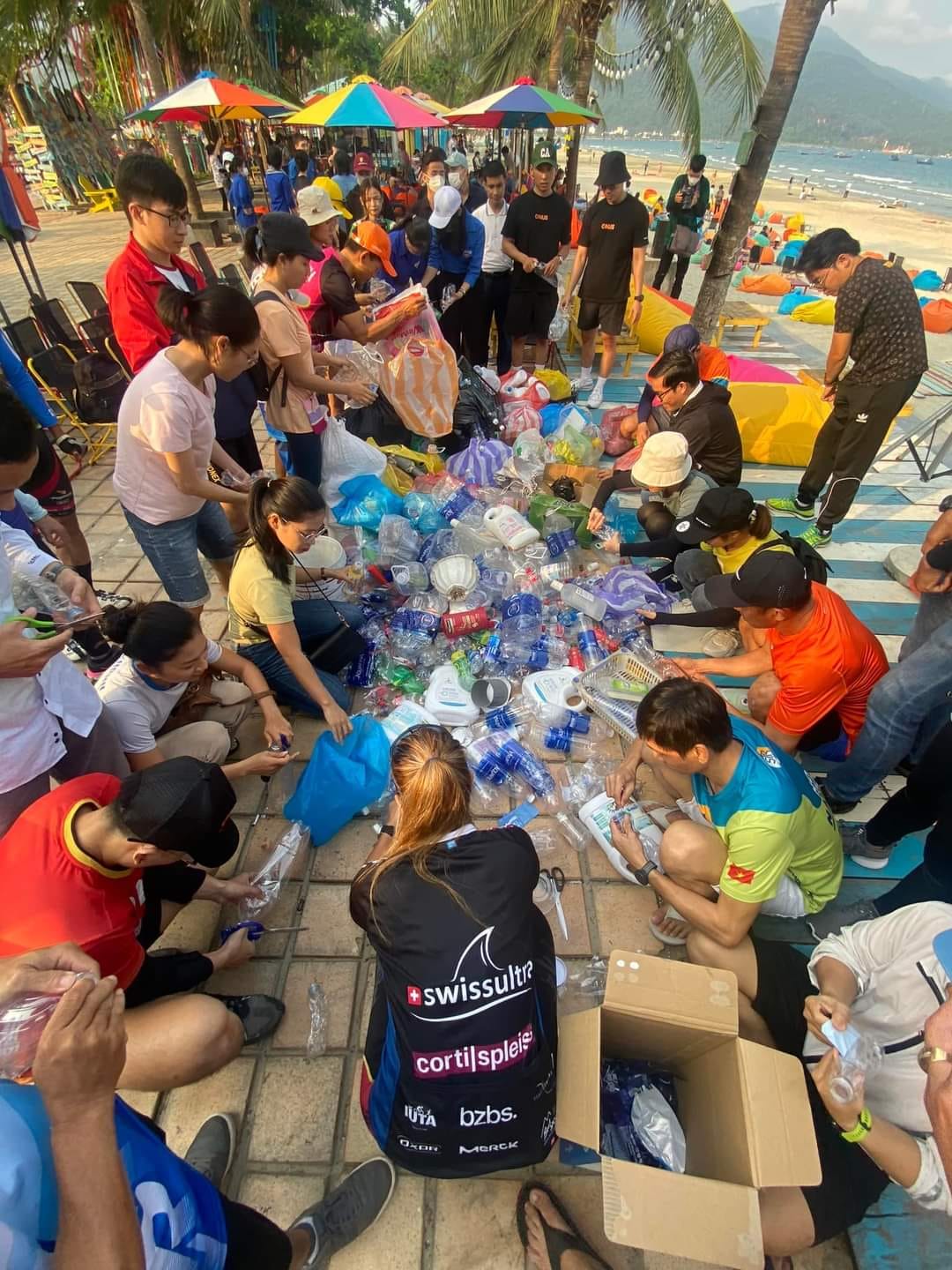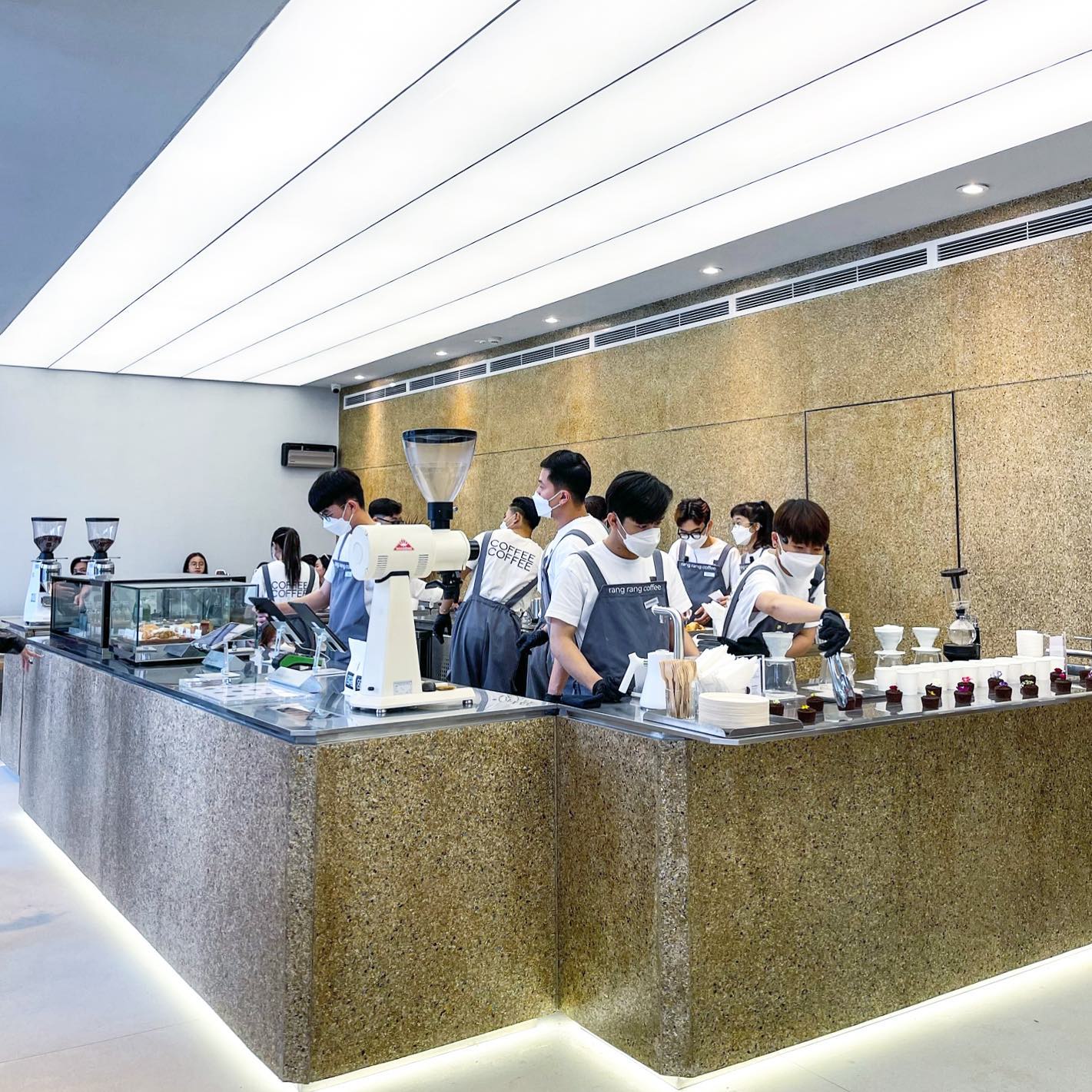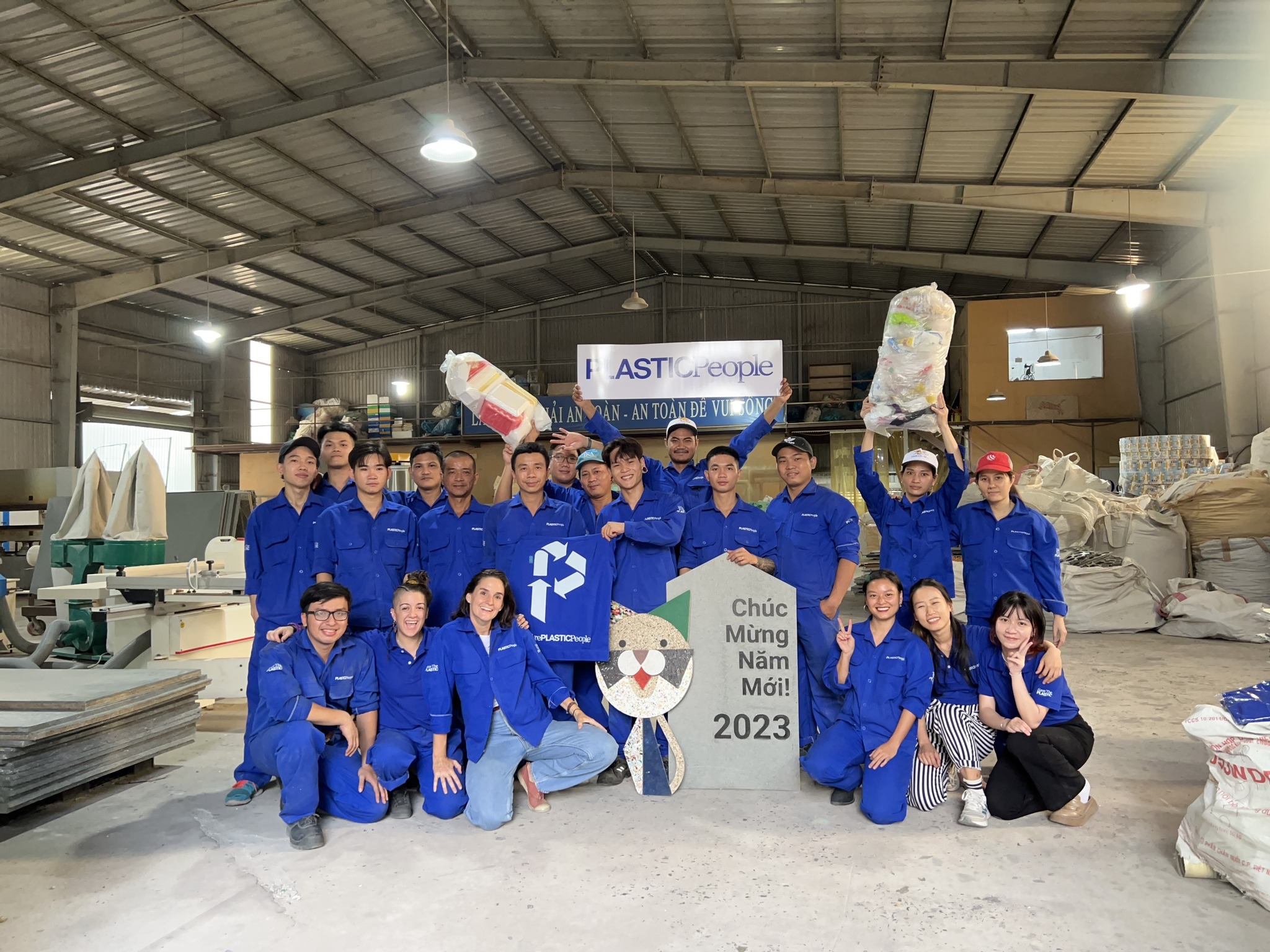Plastic waste on the streets and from families in Ho Chi Minh City has been transformed into quality and beautiful plastic boards -- new materials to make interior designs like tables, chairs, bathroom tiles, reception desks, and other products -- thanks to the tireless work of Nano Morante and his team, Plastic People, in Thu Duc City under Ho Chi Minh City.
Plastic People was formed in September 2021 by Morante, an Argentine, and Nestor Catalan, a Spaniard, as they both wanted to act against the plastic problem in Vietnam, which some estimates ranked fourth globally.
During the COVID-19 challenging times, the company was able to transform 650 metric tons of plastic waste, such as single used cups, milk boxes, lunch boxes, and yogurt containers, back into useful boards and sold all of them to the market.
|
|
| Nano Morante and his team at Plastic People carefully sort plastics at their factory in Ho Chi Minh City. Photo: Quang Dinh / Tuoi Tre |
Each of the standard 2400x1200x20 mm boards is made from around 55-60kg of waste plastic.
Plastic People started small in every aspect -- with two people and US$7,000 -- but it has a big dream to change the world, particularly as the plastic trash is piling up and polluting Vietnamese land, ponds, lakes, and seas.
“Now we have 21 people. We're producing around 270 metric tons per year. We want to do a jump of eight times what we're producing now, to 2,000 metric tons per year by mid-2023," Morante said.
“The more tons of garbage that we produce, the more plastic we can give life to."
|
|
| Products from 100 percent recycled plastic waste made by Plastic People. Photo: Quang Dinh / Tuoi Tre |
The Plastic People factory is close to some big waste collectors in Thu Duc City.
The company pays collectors VND5,000-8,000 (21-34 U.S. cents) per kilogram of plastic.
Besides buying from collectors, it has many plastic heroes and goodwill ambassadors.
In March and April, Viet Vu Phuong Thanh, well known as Thanh Vu, a Vietnamese athlete who won Swiss Ultra Triathlon 2022, started a 28-day bicycle journey across 28 provinces in Vietnam to raise awareness about plastic waste.
Thanh Vu and her team have collected and sorted plastics in different locations and sent them to Plastic People to show communities how their actions matter and can contribute to a lively circular economic model.
|
|
| Thanh Vu and her team have been raising awareness, collecting and sorting plastics in different locations. The collected plastics will be transformed by Plastic People into beautiful, safe, and durable products. Photo: Plastic People’s Facebook account |
Elsewhere in Ho Chi Minh City, students, office workers, and environmental enthusiasts save their plastics and send them to Plastic People daily, thanks to the work of Morante and his team.
Anyone can message Plastic People on their Facebook, ask for the guidelines to prepare and sort out plastics, and the reply usually comes within a few minutes.
“A little effort can make a huge difference! Give us your plastics and we will happily transform 100 percent of them into beautiful, safe, and durable products,” Morante proudly said.
“I think that what we wanted to do in the beginning and what we want to do now is evolving.
“Initially, we wanted to change the world. Somehow along the way, we realized that to change the world, we have to create the world we want together. I love the idea that the whole community is involved in reducing [plastic waste]."
Sitting on the benches outside of his factory where the beaming sun of a hot summer day seemed to cook anyone up, Morante reflected how his company would fit into the complicated system of waste collecting and recycling already established in Vietnam.
“I have never had the problem of not having enough plastic. I talk to the people, I go there, I go there,” Morante said, pointing to the makeshift warehouse of waste collectors around.
“I go, my team goes and talks with the plastic collectors about what we need."
|
|
| The counter of a coffee shop made from Plastic People products in Ho Chi Minh City. Photo: Plastic People’s Facebook page |
When he reaches out to his providers, the Argentine man brings some samples with him -- the type of plastic his factory wants so the collectors can buy for him: all kinds of nylon bags; boxes; yogurt and food containers; plastic wrappers; cookies, spaghetti, and chips bags; hard plastic of all kinds; 100 percent polyester masks; milk and fruit containers; and styrofoam boxes.
They recycle all types of plastic, many of which other recyclers reject. The uniqueness of Plastic People is its 'non-picky' policy and its willingness to cooperate with the community.
“I connect with the people. The garbage pickers work with us. They collect every single plastic item and sell it to us. We pay and we work with them,” Morante talked about his proudest network of informal waste collectors in Ho Chi Minh City.
The company also provides educational workshops and actionable solutions to corporations, local businesses, manufacturers, schools, and the community to inspire them to save plastic.
The Global Plastics Action Partnership estimated that around 3.7 million metric tons of plastic waste is generated in Vietnam each year, a figure that is projected to increase 36 percent between 2018 and 2030.
Only around 10-15 percent of Vietnam’s plastic waste is collected for recycling.
|
|
| The Plastic People team. Photo: Plastic People’s Facebook account |
An estimated 3.1 million metric tons of plastic waste is discharged on land in Vietnam annually.
At least 10 percent of this mismanaged waste leaks into the waterway, making the Southeast Asian country one of the top five plastic polluters of the world’s oceans.
The volume of leakage could more than double by 2030 if nothing is changed, according to a report titled 'Vietnam: Plastic Pollution Diagnostics.'
There are two kinds of plastic waste.
One is post-consumer, that is, after something is used or consumed like fruit, yogurt or any beverage that comes with a plastic container.
The other is before the consumer, or waste that comes from factories.
Post-consumer is the most difficult waste to recycle because companies have to collect them from each and every family.
They also are more difficult to treat as they need to be washed thoroughly.
Morante’s company largely deals with post-consumer plastic and 100 percent of his firm's input materials come from Ho Chi Minh City’s streets and houses.
Plastic People now provides 32 types of products from which designers can make tables and chairs, tiles for surfaces and floors for houses, restaurants, offices, and hotels.
“This material is 100 percent recycled plastic waste. We don't add any chemicals, we don't add any glue or any binding agents. Nothing, not even color," Morante said.
“And this is really important to say because at this point, if you add only 10 percent of recycled plastic to a product, you can call it recycled. But we make 100 percent recycled products."
Products of Plastic People have now started to be exported to Europe, the U.S., Australia, and South Africa.
They hope to expand to different places in Vietnam like Hanoi and Hoi An.
Like us on Facebook or follow us on Twitter to get the latest news about Vietnam!



